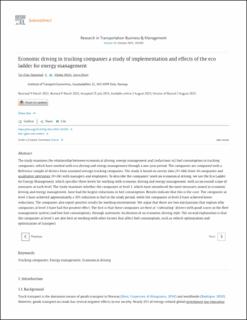| dc.contributor.author | Nævestad, Tor-Olav | |
| dc.contributor.author | Milch, Vibeke | |
| dc.contributor.author | Blom, Jenny | |
| dc.coverage.spatial | Norway, Oslo | en_US |
| dc.date.accessioned | 2024-01-26T12:52:23Z | |
| dc.date.available | 2024-01-26T12:52:23Z | |
| dc.date.created | 2023-08-11T09:05:19Z | |
| dc.date.issued | 2023-08-02 | |
| dc.identifier.citation | Research in Transportation Business and Management (RTBM). 2023, 50 (October 2023), 1-14. | en_US |
| dc.identifier.issn | 2210-5395 | |
| dc.identifier.uri | https://hdl.handle.net/11250/3114102 | |
| dc.description | Tor-Olav Nævestad, Vibeke Milch, Jenny Blom, Economic driving in trucking companies a study of implementation and effects of the eco ladder for energy management, Research in Transportation Business & Management, Volume 50, 2023, 101020, ISSN 2210-5395, https://doi.org/10.1016/j.rtbm.2023.101020. | en_US |
| dc.description.abstract | The study examines the relationship between economical driving, energy management and (reductions in) fuel consumption in trucking companies, which have worked with eco driving and energy management through a one-year period. The companies are compared with a Reference sample of drivers from assumed average trucking companies. The study is based on survey data (N = 366) from 14 companies and qualitative interviews (N = 26) with managers and employees. To describe the companies' work on economical driving, we use the Eco Ladder for Energy Management, which specifies three levels for working with economic driving and energy management, with an increased scope of measures at each level. The study examines whether the companies at level 3, which have introduced the most measures aimed at economic driving and energy management, have had the largest reductions in fuel consumption. Results indicate that this is the case: The companies at level 3 have achieved approximately a 10% reduction in fuel in the study period, while the companies at level 2 have achieved lower reductions. The companies also report positive results for working environment. We argue that there are two mechanisms that explain why companies at level 3 have had the greatest effect. The first is that these companies are best at “cultivating” drivers with good scores in the fleet management system (and low fuel consumption), through systematic facilitation of an economic driving style. The second explanation is that the companies at level 3 are also best at working with other factors that affect fuel consumption, such as vehicle optimization and optimization of transport. | en_US |
| dc.description.abstract | Economic driving in trucking companies a study of implementation and effects of the eco ladder for energy management | en_US |
| dc.language.iso | eng | en_US |
| dc.publisher | Elsevier Ltd | en_US |
| dc.rights | Navngivelse 4.0 Internasjonal | * |
| dc.rights.uri | http://creativecommons.org/licenses/by/4.0/deed.no | * |
| dc.subject | Trucking companies | en_US |
| dc.subject | Energy management | en_US |
| dc.subject | Economical driving | en_US |
| dc.title | Economic driving in trucking companies a study of implementation and effects of the eco ladder for energy management | en_US |
| dc.title.alternative | Economic driving in trucking companies a study of implementation and effects of the eco ladder for energy management | en_US |
| dc.type | Journal article | en_US |
| dc.type | Peer reviewed | en_US |
| dc.rights.holder | 2023 The Authors. Published by Elsevier Ltd. | en_US |
| dc.source.articlenumber | 101020 | en_US |
| dc.description.version | publishedVersion | en_US |
| cristin.ispublished | true | |
| cristin.fulltext | original | |
| cristin.qualitycode | 1 | |
| dc.identifier.doi | 10.1016/j.rtbm.2023.101020 | |
| dc.identifier.cristin | 2166294 | |
| dc.source.journal | Research in Transportation Business and Management (RTBM) | en_US |
| dc.source.volume | 50 | en_US |
| dc.source.issue | October 2023 | en_US |
| dc.source.pagenumber | 1-14 | en_US |
| dc.relation.project | Statens Vegvesen: 1 | en_US |

